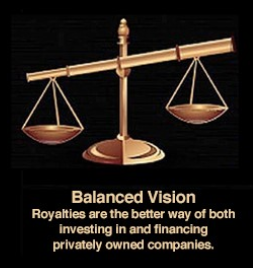
Investors in revenue royalties (royalties) want to profit while minimizing capital risk.
In the case of a royalties, the major risk to investor capital is the inability of the royalty issuing company to generate the minimum revenues necessary to pay the agreed percentage of revenues to investors. Therefore, the investor must be convinced that the diversity of products or services sold to customers by the royalty issuing company will produce value for the customer so that the revenues will continue and grow. Customers can be surveyed, industry experts can be questioned, and third parties can be questioned about the likelihood of royalty issuing companies achieving their minimum performance objectives. Note that the focus is on revenue generation, not profitability achievement.
If the assurance of minimum royalty payment by third parties is required, there will be an associated cost because the third party will require compensation for the risk being assumed. The amount paid to such a third party will be paid by the royalty issuing company and will be reflected in the royalty percentage agreed to by the royalty issuing company. In all financial transactions, risk reduction has an associated cost and investors receive lower returns than if they accepted more risk.
The royalty agreement contains terms, some of which focus on the possibility that revenues and therefore royalty payments will be less than anticipated for the minimum projected annual revenues upon which investor calculations are based. The terms of the agreement can specifically agree to remedies, the enforcement of which can be such that the inherent priority of a royalty payment is paramount to all other company obligations. Terms can require that initial investors receive an agreed minimum IRR as of the maturity of the contract.
Of potential appeal to investors is the possibility that revenues will be greater than the minimum projections, with consequent benefits to the investor. Though we do not suggest that investors base their investments on better than the minimum levels projected by the royalty issuing company, investors should keep in mind the possible success of the company’s ability to sell its products and services at higher levels.
Professional investors of client money are risk focused and will not be swayed by upside possibilities. The projected minimum revenue levels in aggregate will have to provide payments which will result in an acceptable level of Internal Rate of Return (IRR). We believe that there will be professional investor interest at the 15% IRR level for the full royalty payment period, assuming there is an acceptance of the associated level of risk.
The reality of royalty financing of startups and early-stage companies is that usually the issuing companies will want to terminate the royalty prior to maturity of the royalty payment period due to a desire to sell or merge the company or to arrange additional financing. In these cases, the royalty issuing companies will exercise an Issuer’s Right of Redemption, which will stipulate the amount which needs to have been received within an agreed period for the royalty to be terminated.
Frequently, only a limited amount of money will need to be added to that which has already been paid by the company to investors to reach the necessary level of total royalty payment; and the IRR which is likely to be agreed upon will be significantly greater than resulting in a 15% IRR.
Royalties are an effective source of early-stage business financing for business founders and early investors because this form of financing does not result in equity dilution, while allowing investors to benefit from the company’s success. They work for investors as they produce at least a comparatively superior IRR, and perhaps more.
We can assist companies in the structuring of royalties and investors in assessing the balance between risk and reward.
Arthur Lipper, Chairman arthurlipper@gmail.com
British Far East Holdings Ltd.
